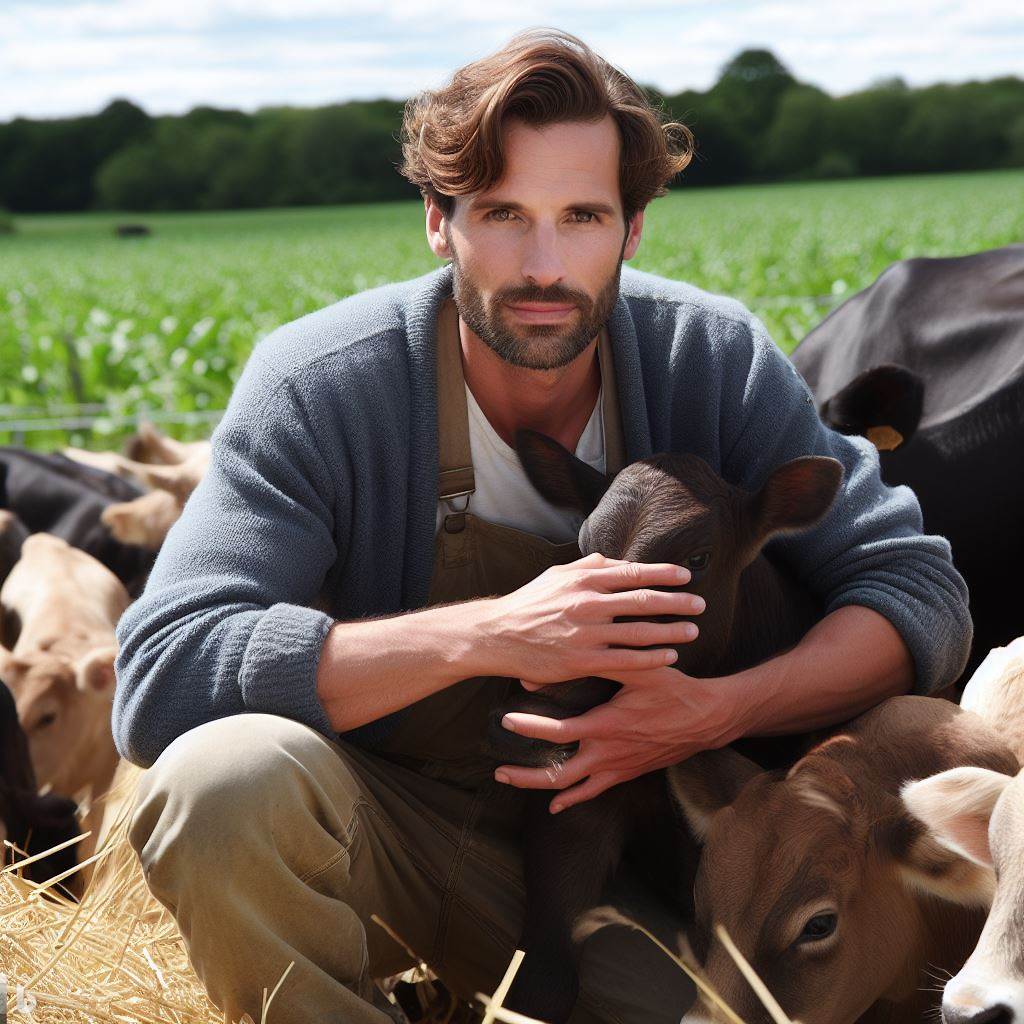Introduction
Imagine a world where the finest horses race to victory, where loyal dogs are renowned for their exceptional traits, and where livestock are prized for their superior genetics.
In this world, animal breeders are the unsung heroes, the architects of genetic excellence.
They play a pivotal role in crafting the future of various species, ensuring that each generation surpasses the last in terms of health, quality, and performance.
The purpose of this blog section is to delve into the qualifications that set top animal breeders in the US apart.
By understanding what makes them excel in their field, we gain insight into how they contribute to the success of breeding programs and the preservation of superior animal genetics.
As we explore the qualities and expertise that define these breeders, we’ll uncover the secrets behind their ability to consistently produce outstanding animals and drive genetic progress.
Knowledge of Animal Genetics
In order to be a top animal breeder in the US, it is crucial to possess a strong knowledge of animal genetics. Here are the key qualifications
Understanding of basic genetic principles
Breeders must have a solid understanding of how genes are passed on from one generation to another.
Having a strong knowledge of animal genetics is vital for any top animal breeder.
It provides the foundation for making informed decisions in breeding programs and ensures the production of healthy and genetically superior offspring.
By understanding basic genetic principles, breeders can predict the inheritance of traits and make intentional breeding choices.
This allows them to improve specific traits in a population over time and work towards breeding animals with desired characteristics.
Familiarity with different breeding methods and techniques
Breeders should be well-versed in various breeding methods such as selective breeding, inbreeding, outbreeding, and crossbreeding.
Familiarity with different breeding methods and techniques enables breeders to choose the most appropriate approach for their goals.
Selective breeding, for example, can be used to enhance specific traits, while outbreeding can introduce genetic diversity and reduce the likelihood of inherited disorders.
Ability to analyze pedigrees and identify desirable traits
Breeders need to be skilled in examining pedigrees to identify and select animals with desirable traits for breeding.
Another important qualification is the ability to analyze pedigrees. Pedigrees are valuable tools that provide information about an animal’s ancestry and traits.
By studying pedigrees, breeders can identify animals with desirable traits and make informed breeding decisions accordingly.
Knowledge of genetic disorders and how they can be avoided or managed
Breeders must be aware of common genetic disorders in animals and develop strategies to avoid or manage them in their breeding programs.
Knowledge of genetic disorders is essential for breeders to prevent or manage these conditions in their breeding programs.
Transform Your Career Today
Unlock a personalized career strategy that drives real results. Get tailored advice and a roadmap designed just for you.
Start NowBy understanding the inheritance patterns of genetic disorders, breeders can avoid mating animals that are carriers or prone to such disorders.
Constantly staying updated with the latest research and advancements in animal genetics
To excel as a breeder, it is essential to stay abreast of the latest research and advancements in animal genetics through continuous learning and attending conferences or workshops.
Furthermore, staying updated with the latest research and advancements in animal genetics is crucial for breeders.
The field of genetics is constantly evolving, and new information and techniques are continually being discovered.
By staying informed, breeders can apply the latest knowledge to their breeding programs and make more effective decisions.
Generally, top animal breeders in the US possess a strong foundation in animal genetics.
They understand basic genetic principles, are familiar with different breeding methods, can analyze pedigrees, have knowledge of genetic disorders, and stay updated with the latest research.
These qualifications enable them to make informed decisions, improve traits in their breeding programs, and ensure the production of healthy and genetically superior offspring.
Practical Experience and Technical Skills
A successful animal breeder in the US must possess a range of practical experience and technical skills to ensure the health and productivity of their breeding programs.
These qualifications include:
Hands-on experience in breeding animals
Top animal breeders must have extensive hands-on experience in breeding different types of animals.
This practical knowledge allows them to understand the intricacies of animal reproduction and develop effective breeding strategies.
Proficiency in performing artificial insemination and other assisted breeding techniques
Proficiency in performing artificial insemination and other assisted breeding techniques is crucial for maximizing the success rate of breeding programs.
Animal breeders need to have thorough knowledge and hands-on skills to perform these techniques accurately.
Ability to handle reproductive challenges and troubleshoot problems
Reproductive challenges and problems are common in animal breeding, and top breeders must possess problem-solving skills to overcome these hurdles.
A deep understanding of animal physiology and reproductive systems enables them to address difficulties effectively.
Proficient record-keeping skills for tracking breeding programs and maintaining accurate data
In order to manage and improve breeding programs, animal breeders need to keep accurate records of breeding activities, including mating dates, genetic information, and health records.
Proficient record-keeping skills ensure the organization and maintenance of crucial data.
Strong understanding of animal behavior and observation skills
A solid understanding of animal behavior is essential to become a successful animal breeder.
Showcase Your Business Today
Reach thousands of readers actively exploring professional services. Publish your business profile and grow your audience now.
Publish NowBy observing and interpreting animal behaviors, breeders can assess reproductive readiness and identify any potential health or behavioral issues that may affect the breeding process.
Basically, practical experience and technical skills play a vital role in the success of animal breeders in the US.
These qualifications allow breeders to navigate through reproductive challenges, perform assisted breeding techniques, maintain accurate records, and understand animal behavior.
By possessing these essential skills, top breeders can achieve successful breeding programs and contribute to the improvement of animal genetics.
Read: US Breeding Regulations: What New Breeders Must Know
Animal Husbandry and Health Management
- Comprehensive knowledge of animal nutrition and feeding practices
- Expertise in managing animal housing and creating suitable breeding environments
- Ability to recognize and address common health issues affecting breeding animals
- Understanding the importance of vaccination and regular veterinary care
- Skills in implementing preventive measures to ensure optimal health and well-being of breeding animals
Animal breeders play a crucial role in ensuring the quality and productivity of animals in the United States.
To be successful in their field, top animal breeders possess key qualifications in animal husbandry and health management.
This section will explore the essential skills and knowledge required for this profession.
Comprehensive knowledge of animal nutrition and feeding practices
One of the primary responsibilities of a top animal breeder is to ensure that breeding animals receive proper nutrition.
This requires in-depth knowledge of animal dietary requirements and feeding practices.
Breeders must understand the nutritional needs of different animal breeds and tailor their feeding programs accordingly.
They must be able to formulate balanced diets that promote optimal health, growth, and reproduction.
Expertise in managing animal housing and creating suitable breeding environments
Providing appropriate housing and breeding environments is crucial for the well-being and reproductive success of animals.
Top animal breeders have the expertise to design and manage animal housing facilities that meet the specific needs of different species.
They understand the importance of factors such as space, ventilation, temperature, and cleanliness in creating ideal breeding conditions.
Breeders also ensure that animals have access to comfortable and hygienic living spaces, promoting their physical and mental well-being.
Ability to recognize and address common health issues affecting breeding animals
As breeding animals are highly valuable assets, it is vital for breeders to be able to identify and address common health issues promptly.
Top breeders have a keen eye for detecting signs of illness or distress in animals.
They are familiar with symptoms of common diseases and disorders that can affect breeding animals.
When health issues arise, breeders take appropriate measures such as administering treatments, consulting veterinarians, or implementing preventive measures to maintain the overall health of the animals.
Understanding the importance of vaccination and regular veterinary care
Vaccination and regular veterinary care play a crucial role in preventing diseases and ensuring the long-term health of breeding animals.
Top animal breeders understand the importance of vaccinations and work closely with veterinarians to develop vaccination schedules.
They follow recommended vaccination protocols and maintain accurate records of vaccinations.
In addition, breeders prioritize regular veterinary check-ups and screenings to detect any underlying health issues early on and address them promptly.
Skills in implementing preventive measures to ensure optimal health and well-being of breeding animals
Prevention is better than cure, and this holds true in the field of animal breeding.
Top breeders possess the skills to implement effective preventive measures to safeguard the health and well-being of breeding animals.
Regularly clean and disinfect animal housing, follow proper nutrition, implement biosecurity measures to prevent disease spread, and monitor animal health.
By taking proactive steps and maintaining a high standard of care, breeders can minimize the risk of health issues and ensure the optimal productivity and quality of their breeding animals.
To become a top animal breeder in the U.S., one needs to master animal nutrition, housing management, health issues, vaccination, and preventive measures.
By possessing these key qualifications, breeders can effectively contribute to the advancement of animal breeding and the overall well-being of the animals under their care.
Read: Financial Prospects of Animal Breeding in the USA

Uncover the Details: Health Benefits and Risks: Life as a US Fisherman
Communication and Collaboration
Ability to effectively communicate with clients, colleagues, and fellow breeders
Effective communication is a crucial skill for top animal breeders in the US.
Whether it’s discussing breeding plans with clients, collaborating with colleagues, or sharing knowledge with fellow breeders, clear and concise communication is essential.
Breeders must be able to understand their clients’ needs and effectively convey information to ensure successful breeding outcomes.
Skilled in explaining breeding plans, genetic concerns, and desired outcomes to stakeholders
Top animal breeders need to have excellent communication skills to explain complex breeding plans to stakeholders.
They must be able to communicate genetic concerns and the potential outcomes of a breeding program.
Clear communication is necessary to ensure stakeholders have a thorough understanding of the breeding process.
Collaborative approach in working with veterinarians, researchers, and support staff
Animal breeders often work closely with a team, including veterinarians, researchers, and support staff.
Collaboration is essential for successful breeding programs. Breeders must be able to work well with others, share information, and collaborate on decision-making.
Showcase Your Business Today
Reach thousands of readers actively exploring professional services. Publish your business profile and grow your audience now.
Publish NowA collaborative approach ensures that all team members are working towards a common goal.
Active participation in professional organizations and networking with other breeders
Top animal breeders understand the importance of professional networking. They actively participate in industry-related organizations and events to stay updated on the latest advancements and best practices.
By networking with other breeders, they can exchange knowledge, gather insights, and build valuable relationships that can contribute to their success.
Willingness to share knowledge and mentor aspiring animal breeders
Experienced animal breeders have a responsibility to share their knowledge and mentor aspiring breeders.
They provide guidance and support to those who are new to the field, helping them develop essential skills and knowledge.
By nurturing the next generation of breeders, they contribute to the overall growth and advancement of the animal breeding industry.
In summary, effective communication and collaboration are key qualifications for top animal breeders in the US.
They must be able to communicate effectively with clients, colleagues, and stakeholders, explaining breeding plans and desired outcomes.
Collaboration is essential when working with veterinarians, researchers, and support staff for successful breeding programs.
Active participation in professional organizations and networking with other breeders contributes to their continuous learning and growth.
Additionally, their willingness to share knowledge and mentor aspiring breeders ensures the sustainability and development of the industry.
These skills and qualities are fundamental to being a successful animal breeder in the US.
Read: Ethical Practices for Animal Breeders: US Standards
Ethical and Responsible Breeding Practices
Commitment to animal welfare and responsible breeding standards
Animal breeders who are considered top-notch in the United States prioritize the welfare of their animals above anything else.
They ensure that all their breeding activities are conducted in a manner that maintains the physical and mental well-being of the animals involved.
These breeders provide clean and appropriate living conditions for their animals, ensuring that they have enough space to move around and access to fresh food and water.
They also prioritize regular veterinary care, vaccinations, and necessary medical interventions to maintain the health of their animals.
Additionally, top animal breeders are committed to following responsible breeding standards.
They conduct thorough research, selecting breeding pairs based on physical and behavioral characteristics, ensuring healthy and genetically sound animals in breeding programs.
This helps in minimizing the risk of passing on hereditary health issues to the offspring.
Avoidance of excessive inbreeding and focus on maintaining genetic diversity
One key qualification for top animal breeders is their emphasis on maintaining genetic diversity within their breeding programs.
They understand the importance of avoiding excessive inbreeding, as it often leads to the accumulation of genetic disorders and reduces the overall health and vitality of the breed.
To prevent these issues, responsible breeders carefully plan their breeding strategies, incorporating outcrossing and genetic testing when necessary.
They collaborate with other breeders and experts to exchange animals and genetic material, ensuring that their breeding program remains diverse and healthy.
Awareness of regulatory and legal requirements related to animal breeding
Top animal breeders in the US are well-versed in the regulatory and legal requirements imposed on animal breeding.
They stay up-to-date with federal, state, and local laws regarding animal welfare, licensing, and documentation.
These breeders obtain the necessary permits and licenses required to operate legally and ensure they adhere to all regulations regarding animal care, housing, transportation, and breeding practices.
They maintain meticulous records of their breeding activities, including pedigrees, health checks, and any other necessary documentation to demonstrate compliance when required.
Transparent and honest dealings with clients regarding breeding outcomes and limitations
Another important aspect of being a top animal breeder is maintaining transparency and honesty when dealing with clients.
These breeders provide clear and accurate information about the breeding process, including potential outcomes, limitations, and risks involved.
Whether it’s discussing the possibility of specific traits or potential health issues, responsible breeders ensure that their clients are well-informed and have realistic expectations.
They are honest about the challenges and limitations of breeding, offering guidance and support throughout the process.
Willingness to make difficult decisions in the best interest of the animals and the breeding program
Lastly, top animal breeders demonstrate the willingness to make difficult decisions in the best interest of their animals and the overall breeding program.
This includes prioritizing the health and well-being of the animals over personal gain or financial profit.
In situations where breeding may pose a risk to the health of the animals or the breed itself, responsible breeders are not hesitant to alter their breeding plans or even halt certain breeding activities.
They prioritize the long-term sustainability and welfare of the breed, making informed decisions based on expert advice and their ethical responsibilities.
To sum it up, being a top animal breeder in the United States requires a deep commitment to animal welfare, responsible breeding standards, and regulatory compliance.
These breeders prioritize animal well-being and maintain genetic diversity.
They follow legal requirements, communicate transparently with clients, and make decisions in the animals’ best interest.
Read: Day in the Life: Following a US Animal Breeder
Showcase Your Business Today
Reach thousands of readers actively exploring professional services. Publish your business profile and grow your audience now.
Publish NowFind Out More: US Farm Subsidies: Impact and Controversies Explained
Conclusion
Recap of the key qualifications for top animal breeders in the US
On a final note, becoming a top animal breeder in the US requires several key qualifications.
These include a deep understanding of genetics, knowledge of breeding techniques, experience in animal husbandry, and strong interpersonal skills.
The importance of these qualifications for successful breeding programs
These qualifications are crucial for successful breeding programs as they ensure the production of healthy animals with desirable traits.
By possessing these skills, breeders can maximize the potential of their breeding stock to produce superior offspring.
Call to action for aspiring animal breeders to acquire and develop these qualifications
For aspiring animal breeders, it is essential to actively acquire and develop these qualifications.
This can be done through formal education, hands-on experience, and continuous learning.
It is also important to network with experienced breeders and seek mentors who can provide guidance along the way.
Ending statement or closing remarks that leave a lasting impression
In closing, becoming a top animal breeder in the US requires dedication, ongoing learning, and a passion for genetics and animal welfare.
By acquiring and developing the key qualifications mentioned, aspiring breeders can make a meaningful impact on the industry and contribute to the advancement of animal breeding practices.
[E-Books for Sale]
The Big Book of 500 High-Paying Jobs in America: Unlock Your Earning Potential
$19.99 • 500 High-Paying Jobs • 330 pages
Explore 500 high-paying jobs in America and learn how to boost your career, earn more, and achieve success!
See All 500 High-Paying Jobs of this E-Book
1001 Professions Without a Degree: High-Paying American Jobs You Can Start Now
$19.99 • 1001 Professions Without a Degree • 174 pages
Discover 1001 high-paying jobs without a degree! Unlock career tips, skills, and success strategies for just $19.99!




